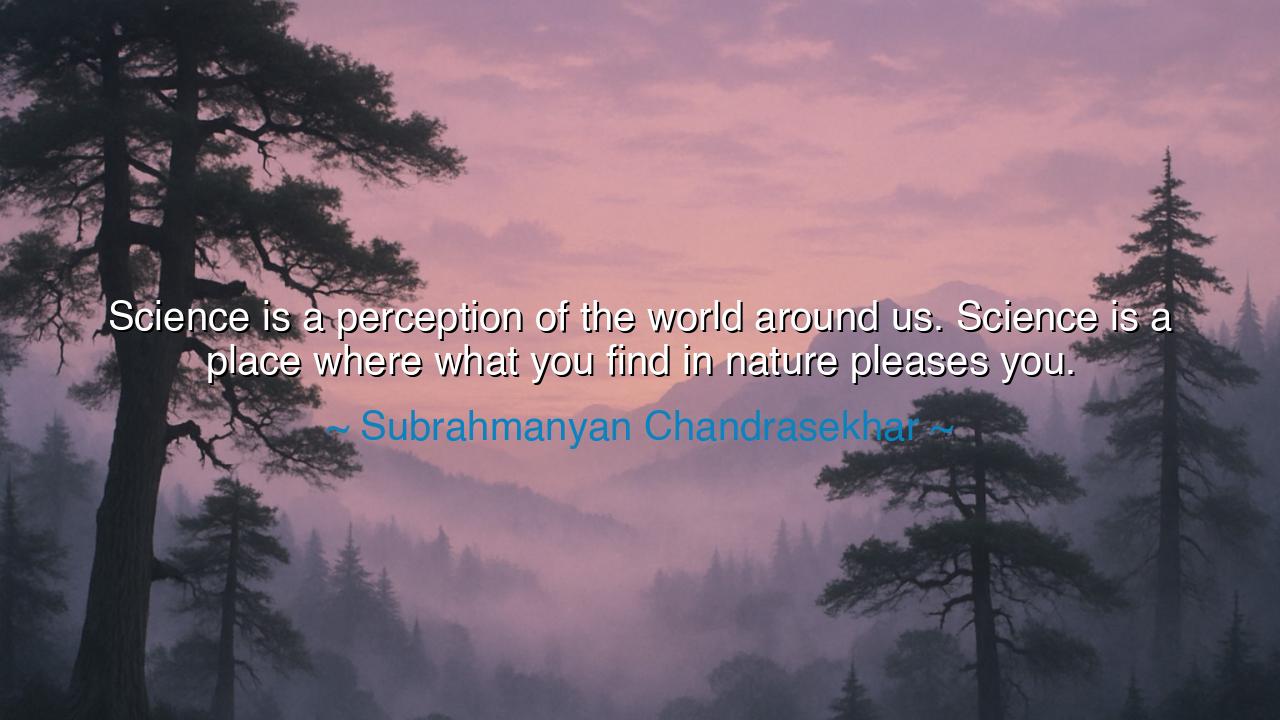
Science is a perception of the world around us. Science is a
Science is a perception of the world around us. Science is a place where what you find in nature pleases you.






"Science is a perception of the world around us. Science is a place where what you find in nature pleases you." These words, spoken by the great Subrahmanyan Chandrasekhar, offer us a profound insight into the very essence of science. For Chandrasekhar, science is not merely a collection of facts or data, but a way of seeing and experiencing the world. It is a lens through which the universe reveals its wonders, a perception that goes beyond the surface to uncover the beauty and truth of the natural world. In this view, science is a celebration, not just of knowledge, but of the joy that comes from understanding the intricate patterns and mysteries that govern existence.
The ancient philosophers also understood that the pursuit of knowledge was not simply about control or dominion, but about harmony with the world around us. Aristotle, in his studies of nature, sought to understand the laws that governed the movements of animals, plants, and the heavens, but his ultimate aim was to understand the world's inherent order and the beauty that lay in it. The great Greek philosophers saw knowledge as a way of attuning themselves to the natural rhythms of the world, not as an end in itself, but as a means to experience life more fully, to see the world with clearer eyes. Chandrasekhar’s quote echoes this ancient wisdom: science is the joy of discovering the hidden harmonies that connect us to the world.
Consider the example of Galileo, who, through the lens of his telescope, saw the moons of Jupiter and the mountains on the moon—wondrous discoveries that expanded the very limits of human knowledge. Galileo’s discoveries were not just about gathering facts; they were about revealing the beauty of the universe in a way that had never been seen before. The way he marveled at the cosmos, seeing in its vastness not just a collection of stars and planets, but a magnificent, ordered system, reflects what Chandrasekhar describes as the joy of finding what pleases you in nature. For Galileo, science was not just an intellectual exercise; it was an emotional, spiritual experience—a way of connecting to the very fabric of existence.
The joy of discovery is at the heart of Chandrasekhar’s view of science. He was not merely a mathematician and physicist, but someone deeply moved by the beauty of the natural world. His work on stellar structure, for example, was not just an intellectual pursuit—it was driven by a desire to understand the forces that govern stars, to uncover the mysteries of their birth, life, and death. Chandrasekhar’s love for the stars was not limited to his scientific understanding; it was a passion that drove him to explore the intricacies of the cosmos. For him, science was not just about finding answers—it was about appreciating the awe and wonder that comes with discovering something new about the universe.
Yet, as much as science is a celebration, it also requires discipline and focus. The discoveries that Chandrasekhar made were not born of idle curiosity, but of years of meticulous study and dedication. The way he approached the field of astrophysics, with deep reverence for the mysteries of the universe, reminds us that scientific progress is not just about gaining knowledge—it is about how we approach that knowledge. Just as the ancients believed that wisdom must be accompanied by virtue, so too must the pursuit of science be guided by a respect for the world and a desire to uncover its truths with humility and awe.
The lesson from Chandrasekhar’s words is that science is not merely a means to control or manipulate the world; it is a way of experiencing the world, of finding joy in the discoveries that arise from nature itself. Science, at its best, is a celebration of the world’s beauty, its complexity, and its mysteries. In your own life, whether you are a scientist, an artist, or simply a curious soul, you can take inspiration from this view of science as a way of seeing the world more clearly, of appreciating the profound beauty in the smallest details and the grandest truths. Science is not just a profession or a set of practices—it is a way of being, a way of experiencing the world with reverence, joy, and wonder.
In your own pursuits, remember that knowledge is not merely about accumulating facts. It is about engaging with the world in a way that brings you closer to the truth of your existence. Whether you are exploring the natural world, delving into the arts, or contemplating the mysteries of life, take a moment to find joy in the journey of discovery. Like Chandrasekhar, who was moved by the beauty of the stars and the intricacies of the universe, seek out the wonder that lies in the pursuit of knowledge. The pleasure you find in the process of discovery will not only enrich your life, but it will connect you to the larger world, to the universe itself, and to the timeless quest for understanding that has driven humankind since the beginning of time.






AAdministratorAdministrator
Welcome, honored guests. Please leave a comment, we will respond soon